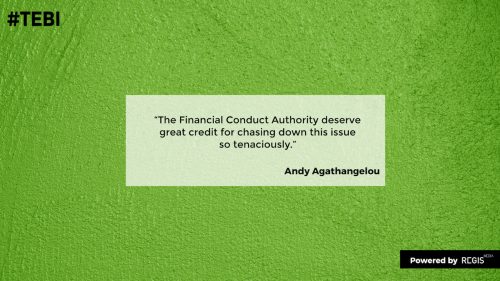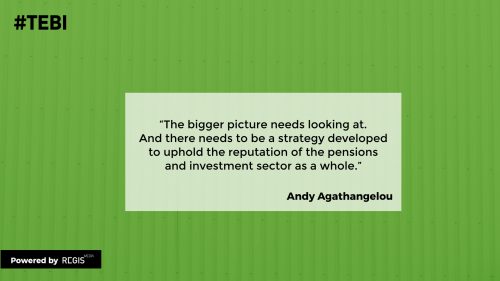I’ve written many times on this blog about closet trackers. Closet index tracking is the very dubious (but sadly widescale) practice of charging active management fees for funds that essentially hug an index. Fund managers the world over have been getting away with it for years.
Well, I’m now pleased to report some very welcome news on this issue, here in the UK. Our regulator, the Financial Conduct Authority, has revealed that a number of asset managers have been forced to pay back £34m to investors overcharged by closet index funds.
“By the end of last year, we’d reviewed 84 potential closet tracker funds,” said the FCA’s Director of Supervision for Investment, Megan Butler. “In 64 funds we’ve required the manager to make it clearer to consumers how constrained they are. We found the other 20 were adequately describing how they were being managed.
“Overall, £34m in compensation has been paid to consumers. Separately, an enforcement investigation is ongoing against one firm.
“Consumers should be aware how expensive their funds are, what risks they face and what rewards they may receive. This will help them understand whether a fund is right for them and offers overall value. We want consumers to have confidence that, when they buy a fund, they know it will do what it says on the tin.”
My first reaction is that £34 million is a tiny drop in the ocean compared to the total amount that investors have overpaid for closet trackers. The FCA’s market report into the asset management sector, published in June 2017, stated there was £109 billion in partly active funds charging fully active fees.
I’m also disappointed that, for whatever reason, the FCA has decided not to name and shame the company concerned.
Nevertheless, the news is hugely significant. It appears, to some of extent, to allay the concern of many of us that the FCA was simply talking tough about transparency in asset management without matching its words with action. Also, it does open up the possibility that regulators elsewhere in the world will follow the UK’s lead and start holding closet indexers to account.
TEBI will be keeping you up to date on this very important story in the coming weeks and months. For now, though, here is the reaction of Andy Agathangelou, Chairman of the Transparency Task Force. The TTF, for which I’m proud to act as an official Ambassador, has campaigned on this issue for some time, and I pretty much concur with everything Andy says in his response to the FCA’s move:
“I think this is hugely positive news for investors, particularly long-term pension savers, right around the world; and that it can become a platform for further change and reform.
“There’s been a smoking gun on the awful issue of closet trackers for years so whilst it’s a case of ‘better late than never’ The Financial Conduct Authority deserve great credit for chasing down this issue so tenaciously since their Asset Management Market Study. Well done also to ESMA, Better Finance, The True and Fair Campaign and the mighty mavericks such as Dr Chris Sier, Dan Norman, Henry Tapper, David Pitt-Watson, Con Keating, Saul Djanogly et al. for their courageous and relentless research and campaigning on this and similar issues over many years; far before the Transparency Task Force was created.
“It is now perfectly clear that the killer combination of courageous campaigning and robust regulation is going to clean up the parts of the asset management sector that need sorting. Sunlight continues to be the best disinfectant and ‘parading the problem’ continues to be an effective tactic.
“There are now many new and important questions that must be answered; here are the first few that come to mind:
1. Which asset managers are involved?
2. Which asset manager is facing enforcement action from the FCA (as reported) for “very misleading” marketing information?
3. Should the investors that have suffered material detriment not just be compensated for the excess fees they have paid but also for the lost returns they could/should/would have had, had their monies been invested in the way described by the asset managers?
4. On the basis that “accountability cures,” who (i.e. which individuals) within the firms involved are responsible; and what should now happen to them?…or is it (yet another) case that ‘those at the top didn’t know what was going on’?
5. How will the vast majority of asset mangers who have not in any way been involved with this kind of malpractice respond? Should they not demand that the relevant trade bodies and professional associations take appropriate enforcement action? If not, why not? – not every apple in the barrel is a bad one, far from it. Surely, without the proper enforcement action being taken by the trade bodies and professional associations to proactively raise the level of market integrity in the sector, the cultural transfusion that is so desperately needed throughout financial services will never happen. Or, are the levels of moral integrity and ethical standards within financial services so low that this kind of practice has become “business as usual” for the sector, not even warranting a united response from innocent market participants? Unless there is now tough, tenacious and targeted action by the sector to rid the industry of the root causes of the behaviour that has been displayed then the industry is in effect saying to the market “we are either unwilling or unable to put our house in order and we deserve any burdensome, bureaucratic and costly regulation we get, that our clients will ultimately have to pay for.” Surely the industry can do better than that?
6. How will this sorry episode further damage the brand of pensions and investments in not just he UK market but overseas as well? We cannot afford ongoing undermining of trust in the sector; there is such little of it left. Who is responsible for repairing that reputational damage? Surely it is those that have caused it. Do we need a policy of “polluter pays” applied to financial services companies that misbehave and damage the reputation of the whole sector. The ongoing erosion of trust and confidence in the sector is a is a systemic risk that needs managing. As an example, we don’t want (and cannot afford) a mass exodus of pensions savers that have been automatically enrolled into pensions because of the extensive adverse publicity this will inevitably lead to. The bigger picture needs looking at and there needs to be a strategy developed to uphold the reputation of the pensions and investment sector as a whole. We need a financial services industry that embraces the need for greater transparency, truthfulness and trustworthiness.
7. Is this perhaps the kind of reason why some asset managers were unwilling to sign up to the Investment Association’s code of conduct that required their members to put the interests of clients first and foremost? Should that idea be revisited? Isn’t an OK code better than none at all?
8. If it is appropriate to compensate investors for the material detriment they have suffered due to ‘closet trackers,’ what about compensating them for similar issues such as hidden/unjustifiable transaction costs; or any other hidden cost, for that matter? Will this sorry episode herald the advent of US-style class actions (adapted for the UK market’s legal system) particularly for pension savers from Defined Contribution pension schemes that are able to show they have suffered material detriment? Is what they have experienced fair? If not the consequences are going to be very obvious and very predictable…
“On a more positive note one can hope this is all just one more painful step in the asset management sector becoming an honourable profession – much of it already behaves in the right way and it would be a huge mistake to think all asset managers stoop to the kind of behaviour that has been reported. A big bright light needs to be shone on those that have behaved badly; but an even brighter one should be shone on the market dynamics that set the scene for it to happen, so that similar debacles can be avoided in the future.
“My (comments here are) well-intended and respectful of the innocent vast majority of asset managers.
“I hope it sparks some constructive discussion and debate; that is its purpose – particularly around the idea here should be a coordinated effort to uphold the reputation of the sector and to deal with those that undermine it.”
ROBIN POWELL is the founder and editor of The Evidence-Based Investor. A freelance journalist, he runs Regis Media, a specialist content marketing consultancy for financial advice firms around the world. You can follow him on Twitter and on LinkedIn.
The Evidence-Based Investor is produced by Regis Media, a boutique provider of content and social media management to financial advice firms around the world. For more information, visit our website and YouTube channel, or email Sam Willet or Christina Waider.
How can TEBI help you?










